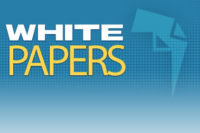Metallized Carbon Corp.’s oil- and grease-free, self-lubricating, mechanical carbon materials solve problems associated with typical oil/grease lubricants and produce foods safely and cost effectively.
By Glenn H. Phelps, technical director
Metallized Carbon Corp., Ossining, N.Y.
What’s the secret to continuously baking or processing cakes, pizza, chicken, beer and thousands of other foods and beverages?
It’s the mechanical carbon materials used in the food processing equipment that produces these foods safely and cost effectively. Metallized Carbon Corp.’s oil- and grease-free, self-lubricating, mechanical carbon materials are used in conveyors on processing lines, packaging lines and food handling canning machines. Its use solves problems associated with typical oil/grease lubricants, which may contaminate food or cause equipment failure.
The Metcar materials are used for bearings on conveyors for continuous food baking ovens and on continuous roasting ovens. Sleeve, thrust, pillow block and flange bearings are used in horizontal revolving ovens, vertical rotating rack ovens and tunnel ovens for baking cookies, cakes, pies, donuts, bagels, bread, pizzas, taco shells and pretzels. The bearings also are incorporated in continuous roasters for roasting chicken, turkey, ham and coffee, as well as equipment where parts run submerged in liquids.
Depending upon the use, Metcar materials come in various grades. In fact, several have been accepted by the Food and Drug Administration as “Generally Recognized as Safe” (GRAS) for food contact applications. These grades contain no FDA-prohibited substances and are impervious to liquids, which is achieved by filling the base carbon-graphite material’s available porosity by vacuum/pressure impregnating the material with either thermal setting resins, molten copper, molten bronze or molten nickel-chrome. The impervious surfaces can be easily washed or steam cleaned and there is no porosity within the material where bacteria could grow.
For contact with liquids with a pH above 6, Metcar grades impregnated with copper and bronze are recommended. For acidic foods with pH below 6, such as vinegar, fruit juice or wine, Metcar grades impregnated with thermal setting resins or nickel chrome are recommended. The materials are available as either finished parts machined to customer specifications, or as oversized blanks that customers can machine themselves. Sizes up to 18 inches in diameter are available.
High temperature uses
At high temperatures (greater than 300°F), traditional oil/grease lubricants may volatilize or carbonize and lose their lubricating qualities. This can cause high friction, high wear, galling and possibly seizing of metallic rubbing parts, resulting in costly maintenance and down time. Polymeric seals in oil/grease-lubricated bearings can fail by melting or carbonizing and allow the oil/grease lubricant to flow out and contaminate the food.
Bearings manufactured from Metcar materials are self-lubricating, non-galling, dimensionally stable, uniform throughout and have high compressive strength. Additionally, they are excellent candidates for bearings and other mechanical components because they provide long wear life when operating at elevated temperatures. The most commonly used Metcar grades for high temperature applications are Metcar Grade 1515 (copper impregnated, carbon-graphite) and Metcar Grade 1126 (bronze impregnated, carbon-graphite), all of which are appropriate to temperatures as high as 700°F.
Submerged low-viscosity beverages or liquefied foods
Oil/grease lubricated metal bearings normally should not be used when the food processing equipment parts must run submerged in low viscosity beverages or liquefied foods, such as potable water, milk, beer, soda, fruit juices and pharmaceuticals. This is because oil/grease lubricants can dissolve, wash away or contaminate the product being handled. Metcar materials are chemically resistant to all liquids except for extremely strong oxidizing acids and alkalis and can provide long wear life in submerged applications. Metcar grade M-400 and M-106 (resin impregnated, carbon-graphite) are most appropriate for this application.
Specialized Metcar grades for pharmaceutical, medical and water supply use
Several Metcar grades primarily used in the food processing industry have met additional stringent testing, which allows them to be used for pharmaceutical uses, as well as in public water supplies.
For example, Metcar Grades M-101, M-400 and M-312 have passed the stringent tests required for U.S. Pharmacopoeia Class VI Approval, compulsory for materials used in dental implants, implant tubing, drug containers and prosthetic devices such as artificial heart valves.
Metcar Grade M-400, M-106 and M-133 have also been tested and approved for equipment parts used in contact with the United Kingdom’s public water supply. To meet this standard, the materials passed the tests associated with the United Kingdom’s Water Regulations Advisory Scheme.
Finally, a unique Metcar grade, M-702, is available for dry running in dry nitrogen or in vacuum. This grade is used in mechanical seals where dry nitrogen is used as the barrier gas between two mechanical seals, and is approved for use in critical pharmaceutical mixers.
For more information on the Metcar grades of mechanical carbon materials, contact the Metallized Carbon Corp.’s Applications Engineering Department.
Get our new eMagazine delivered to your inbox every month.
Stay in the know on the latest dairy industry trends.
SUBSCRIBE TODAYCopyright ©2024. All Rights Reserved BNP Media.
Design, CMS, Hosting & Web Development :: ePublishing
